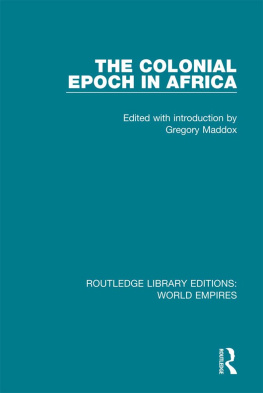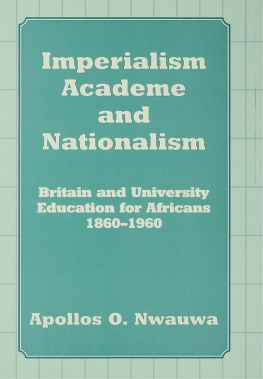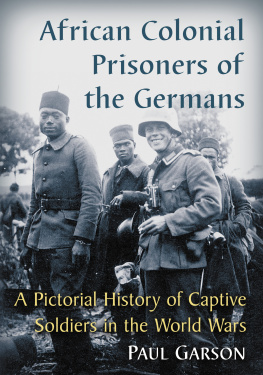First published in 1993 by Garland Publishing, Inc.
This edition first published in 2018
by Routledge
2 Park Square, Milton Park, Abingdon, Oxon OX14 4RN
and by Routledge
711 Third Avenue, New York, NY 10017
Routledge is an imprint of the Taylor & Francis Group, an informa business
1993 Series introduction Gregory Maddox and Timothy K. Welliver
1993 Introduction Gregory Maddox
All rights reserved. No part of this book may be reprinted or reproduced or utilised in any form or by any electronic, mechanical, or other means, now known or hereafter invented, including photocopying and recording, or in any information storage or retrieval system, without permission in writing from the publishers.
Trademark notice: Product or corporate names may be trademarks or registered trademarks, and are used only for identification and explanation without intent to infringe.
British Library Cataloguing in Publication Data
A catalogue record for this book is available from the British Library
ISBN: 978-1-138-47911-1 (Set)
ISBN: 978-1-351-00226-4 (Set) (ebk)
ISBN: 978-1-138-48213-5 (Volume 10) (hbk)
ISBN: 978-1-351-05855-1 (Volume 10) (ebk)
Publishers Note
The publisher has gone to great lengths to ensure the quality of this reprint but points out that some imperfections in the original copies may be apparent.
Disclaimer
The publisher has made every effort to trace copyright holders and would welcome correspondence from those they have been unable to trace.
THE COLONIAL EPOCH IN AFRICA
Edited with introduction by
GREGORY MADDOX
Series introduction copyright 1993
Gregory Maddox and Timothy K. Welliver
Introduction copyright 1993 Gregory Maddox
All rights reserved
Library of Congress Cataloging-in-Publication Data
The colonial epoch in Africa / edited with an introduction by Gregory Maddox.
p. cm. (Colonialism and nationalism in Africa; v. 2)
Includes bibliographical references.
ISBN 0-8153-1389-6
1. AfricaHistory18841960. 2. ColoniesAfrica.
I. Maddox, Gregory. II. Series.
DT29.C575 1993
The study of African history as an academic discipline is a rather new field and one that still has its detractors both within and outside academics. The eminent British historian Hugh Trevor-Roper, now Lord Dacre, is once reputed to have said that African history consisted of nothing but the murderous gyrations of barbarous tribes, while more recently the Czech novelist Milan Kundera has written to the effect that even if it could be proved that hundreds of thousands of Africans died horrendous deaths in the Middle Ages it would all count for nothing. At the very least, such views are a matter of perspective; for the 400 million or so people living in the nations of sub-Saharan Africa today history still shapes the rhythm of their destiny.
This collection of articles highlights for students and scholars the modern era in African history. It brings together published research on the colonial era in Africa, an era relatively brief but one that saw dramatic change in African societies. It highlights the ongoing research into the struggles for independence and social transformation that continue to the present. The authors of these articles eloquently rebut the Euro-centric bias of critics like Trevor-Roper and Kundera and claim for African societies and Africans their rightful place as agents of history.
The articles collected here cover the period between the Scramble for Africa in the late nineteenth century, when all but two nations in Africa became colonies of European powers, and the struggles to define the meaning of independence in Africa and throw off the last vestiges of white rule in the southern part of the continent. Such a concentration by no means implies that African societies before the late nineteenth century were tradition-bound or unchanging. They developed according to their own pace and played significant roles in world affairs from the days when West Africa provided a major proportion of the Old Worlds gold before 1500 through the era of the Atlantic slave trade. However, the colonial era created the modern map of Africa, and Africans transformed their societies politically, economically, and socially in the face of their forced integration into the world economy as producers of raw materials.
The articles in this collection chart the development of African historical studies. As the field emerged in the late 1950s and early 1960s, many historians sought to place the struggle by African peoples to liberate themselves from colonialism and racial domination within a historical tradition. Some scholars, inspired by T. O. Rangers work, sought to link modern nationalist movements to resistance to colonial rule in the late nineteenth century. They also focused on the development of what they saw as a national consciousness that overlaid existing economic, ethnic, and religious communities.
The reaction to this approach was not long in coming within both African politics and historical scholarship. The ongoing struggles within African nations, often defined in ethnic terms, find their image reflected in early critical works such as those of Steinhart and Denoon and Kuper included here that question the development of national consciousness. More generally, as I. N. Kimambo of Tanzania has argued, there was a turn towards economic and social history that concentrated on the transformation and relative impoverishment of African societies under colonialism. Some scholars have gone so far in the search for the origins and meanings of community in Africa as to reject the modern nation state as of much use as a unit of analysis. Basil Davidson, one of the most influential pioneers in African historical research and a long time supporter of African liberation, has recently produced a volume that calls for a reconfiguration of African political life to fit the reality of African communities (The Black Mans Burden: Africa and the Curse of the Nation State).







